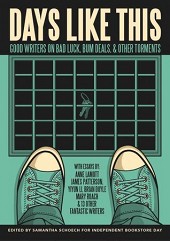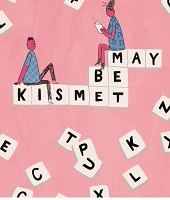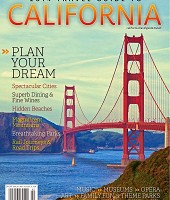
Independent Bookstore Day’s anthology: “My Lesson from Hell”
by Lavinia Spalding (google+)“What’s going on?” Dan asked, smiling. He nodded at my feet, which tapped to the beat of zero music. My hands were in constant motion, too—fidgeting with my phone, flipping through the in-flight magazine, rustling in my purse, playing with the barf bag. I was like a four-year-old. But I’d rarely been so impatient to arrive somewhere.
We were en route to Arizona to attend a weekend Buddhist retreat. Dan’s experience of Arizona, till then, was limited to a Grand Canyon family vacation and a generic Phoenix strip mall where he once bought albums during a layover, and I was excited to show him my Arizona: the sweet, picturesque mountain town of Flagstaff, where I lived from ages ten to eighteen. We’d stay with my oldest friend from high school, Kim, and in the mornings walk to one of my favorite downtown cafés. During the day we’d attend the dharma teachings, and in the evenings have cocktails at the bar where I was served my first alcoholic drink at age eleven. (My babysitter jokingly ordered me a coke with peppermint Schnapps, and though the owner shook his head and muttered about losing his liquor license, no one took it away.) Above the bar hung framed black-and-white photos of notable musicians who had performed there over the years, and I wanted Dan to see the picture of my father holding his lute.
I’d show him my schools, my jobs, my haunts, and the old stone house where my parents lived for twelve years, till my dad was diagnosed with emphysema and advised to move away to a lower elevation. Though I never lived in the house myself, it was the closest I had to a family home. After dating Dan for just over a year—and keeping him at arms’ length most of that time—I felt ready, finally, to invite him deeper into my life. Flagstaff was a crucial element. The forecasts predicted snow—they generally did—but my good-natured boyfriend wouldn’t mind; it would be pretty, and I knew he’d be charmed by Route 66, the snowcapped peaks, the old train station dusted white, the red-bricked historic downtown square, and all the locals wearing colorful pom-pommed felt hats, walking dogs and riding funky bicycles.
But I was even more excited for the retreat, and the opportunity to introduce Dan to my teacher, Khentrul Lodrö Thayé Rinpoche. The abbot of a large monastery in Tibet, Rinpoche was wise and funny; his lessons were clear and accessible, and he did a spot-on John Wayne impersonation. Eight years earlier Rinpoche had singlehandedly turned me into a practicing Buddhist after I heard him give just one public talk, and I secretly hoped he’d do the same for my boyfriend, who was loosely Protestant. I fantasized that after returning from Flagstaff, Dan and I would meditate together.
But it wasn’t just excitement making me squirm. I was nervous, too. What if Dan didn’t enjoy the teachings? Or embarrassed me by asking overly academic and esoteric questions? What if my favorite Flagstaff restaurants paled in comparison to the San Francisco eateries we frequented? What if we ran into one (ok, five) of my ex-boyfriends? What if he wasn’t charmed?
I needn’t have worried, because none of that happened. Instead, I got sick. Immediately, horribly sick. The teachings began Saturday morning, and at three a.m. on Friday, I woke up coughing. By the following morning I was miserable. Just a little karma working itself out, I told myself in the shower, hoping the steam and optimism would clear my sinuses.Just an obstacle I need to overcome.
The retreat was being held in a conference room at a hotel called Little America, and as we walked through the lobby that morning, past the gift shop filled with Navajo rugs, Stetson hats, and turquoise pendants, I thought of other times I’d been there. The high school prom in 1985—my date a short, ugly wrestler who stranded me without a ride home so he could have sex with another girl. My ten-year high school reunion, where I won an award for having traveled the farthest and got hit on by guys (cute and popular then, squishy and bald now) who ignored me in high school. The night I drank gin and tonics in the lounge with a man I loved who didn’t love me but enjoyed stringing me along; he sketched me on a bar napkin and I kept it tucked in a journal, long after he married someone else. And finally, eight years ago, when I visited a relative who was in town for my father’s funeral. All that, and the lobby never changed. It both comforted and disturbed me.
The room where the dharma teachings were being held buzzed with friends and acquaintances—practitioners I’d met over the years, family friends I hadn’t talked to in twenty-five years, teens I’d last seen when they were three feet tall. My sister was there, my therapist, even the publisher of my first book. I smiled, waved, received their hugs limply, and collapsed onto a folding chair in the back of the room. I usually claimed a spot up front, cross-legged on a floor cushion, but Dan’s back was hurting, and after keeping him awake all night with my coughing, I owed him some comfort.
Rinpoche, perched on a throne-like chair, looked around the room and beamed at his students. When his eyes landed on me, he wrinkled his face in concern, frowned, and lifted his eyebrows as if to say: Are you ok? You don’t look so hot. I shrugged, nodded, and smiled reassuringly—swallowing an impending coughing fit. And when he began to teach, I leaned forward, copying his words into a small red notebook.
Our thoughts motivate our experience, I wrote. Because we have too many thoughts, our mind is not at peace, and we have inner suffering and turmoil. One purpose of meditation is that it pacifies the thoughts, and the primary purpose of meditation is that our mind becomes useable. When we begin to cultivate a calmer mind, it also affects our physical health.
It was good information for my ever-restless mind, my rarely pacified thoughts. But it was looking a bit late for my physical health. I was a mess—and getting messier by the minute. While everyone else sat silently, I sniffled, hacked, sneezed, blew my nose, ran out of tissue, swallowed my own snot, and finally began excusing myself every ten minutes to visit the restroom. Other sangha members, sitting perfectly straight-spined on floor cushions—red shawls draped elegantly over their shoulders as they fingered their mala beads and looked irritatingly healthy—glanced over occasionally and smiled in sympathy. I smiled back, comforted by the knowledge that they were Buddhists who weren’t supposed to feel annoyed by my turmoil and suffering. At noon the session ended, and Rinpoche suggested we all meditate together for ten minutes. I hoped Dan would be able to meditate and that it would change his life, as it had changed mine. Meanwhile I meditated on: Why this weekend? I feel like a bag of wet donuts. How am I supposed to focus on my breath when I can’t even breathe? This sucks. My throat hurts.
We broke for two hours. For months I’d envisioned spending our lunch breaks holding hands at cozy window tables in my favorite downtown restaurants, dining on delicious organic soups and sandwiches and sipping tea while discussing Buddhism. Instead we roamed the aisles of Long’s Drugstore stockpiling medicine, then warmed up canned chicken-noodle soup in Kim’s microwave and napped in her twin-sized guest bed for twenty minutes. We sped back to Little America, arriving just as the afternoon session started.
Thirty minutes in, Dan started clearing his throat. “Uh-oh,” he whispered.
That night, instead of being treated to the sushi dinner we’d promised her, Kim tiptoed around us as we lay slumped on her sofa watching TV and blowing our noses loudly, juicily. She delivered hot tea and blankets, and we depleted her ibuprofen and tissue. We also spilled Robitussin on her beautiful white sheets, kept her awake all night with our coughing, broke one of her lamps, and (we later found out) gave her our flu.
On Sunday morning, day two of the teachings, we woke to discover a blizzard had buried the town. There was a foot of snow now, the windows were caked with ice, and it was 18 degrees out. Dan had chills and ached all over, while I burned up with fever. We hadn’t slept a solid hour during the night.
“Should we try to go?” I asked, coughing. “We should try to go.”
Dan lifted his head an inch from the pillow, and with bloodshot eyes and an anguished look, shook his head once and fell back asleep. We’d skip the morning teachings, I decided, but attend the second session, if only to say goodbye to Rinpoche.
The mind chases after desire,Rinpoche said that afternoon. The mind wants, wants, wants. We are always under the power of the “wanting” part of mind. But this desire does not lead to contentment. The getting isn’t the solution. It’s like salty water—the more we drink the thirstier we become.
I’m dying, I wrote in the margin of my notebook.
For the first time at a dharma event, because of my weakness and inability to concentrate on anything beyond self-pity, I felt I wasn’t gaining anything from the lessons. When the afternoon session concluded, Rinpoche took both my hands, looked into my eyes seriously, and entreated me to please go home and rest and take care of myself. We followed his instructions, stumbling into Kim’s house at 6 pm. We nosedived into bed and remained there till morning.
Our flight on Monday didn’t depart till 9 pm, and wretched as we both felt, I couldn’t let go. I was determined to inflict the full nostalgia tour on my boyfriend before we drove to Phoenix to fly home. I couldn’t leave without taking him by my childhood homes, my schools, and my first three restaurant jobs, Bunhuggers, Sizzler, and Mandarin Gardens. I needed to show him downtown—or at least the side-by-side storefronts on Leroux Street: Starrlight, the used bookstore my mom started, and The Collection Connection, my dad’s antique shop (now a Z-Gallerie). Fifteen years earlier, when my parents owned the two businesses, they spent countless hours leaning against their respective doorways chatting between customers, and I still couldn’t drive down Leroux Street without seeing them there. Even though—or maybe because—Dan had never been able to meet my father, it felt important that he see those doorways, imagine that tableaux.
Instead he napped all day, and I fell asleep under a thick blanket watching Eat, Pray, Love. At four in the afternoon, we packed, hugged Kim goodbye (and thank-you and sorry), dragged our bags through the thick snow to the rental car, and scraped ice off the windows.
“We still have time,” Dan said as we huddled in the car, trying to warm our frozen hands by the dash.
“Forget it,” I whined. “The trip is ruined. I don’t care anymore.”
“No, let’s do it,” he said, his voice thin and his face the color of dead grass. “I want to see your world.”
I relented, waving him weakly in the direction of the low-rent neighborhood where I grew up. But after a drive-by of three unremarkable houses, followed by my equally unimpressive elementary school, junior high, and high school, Dan’s brave front gave way to fever, and we headed south on I-16, away from my quaint mountain town and all its memories. Back to Phoenix and the airport and home to San Francisco, where our doctors called it “a touch of pneumonia” and prescribed antibiotics. We got better, and later Dan described the weekend as a fever dream. But I didn’t get my wish—he hadn’t become a Buddhist, didn’t start meditating with me. His stance on the dharma remained the same: he was respectful and curious and loosely Protestant.
And I was deflated. I’d packed months’ worth of expectations into one weekend. Of course, as a Buddhist trying to practice non-attachment, I should have known better. I should have considered the intrinsic nature of impermanence. And as a world traveler, I should have known better. I should have remembered that expectations make lousy copilots, and that every trip is a crash-course in accepting impermanence and practicing non-attachment.
Nothing catastrophic happened that weekend. I didn’t lose my home, my heart, my family. I lost only the concept of a perfect weekend I’d choreographed in my head, an imaginary experience to which I’d become irrationally attached. But somehow the loss felt more significant. Until a few weeks later, when I stumbled upon a quote from the Buddha— “You only lose what you cling to”—and realized I’d also gained something significant that weekend: the dharma lesson I’d supposedly gone for in the first place.
Going: New Orleans, The Southern US City Where Jazz Was Born
Parents: I Grew Up in a Haunted House—Here’s What I Tell My Child About Ghosts
AFAR: Seoul Food
Off Assignment, Letter to a Stranger: “To the Shopkeeper in Fez”
The Bold Italic: “Working Three Jobs Nearly Killed Me”
AirBnB Magazine: “So I Slept in a ...Cave”
AAA Westways Magazine: “Korean Encore”
AFAR.com: “Everything You Need to Know About Jazz Fest”
AFAR.com: “Get Beyond the Beads: The 101 on Mardi Gras Throws”
AFAR.com: “The Art of Eating Crawfish in New Orleans”
AFAR.com: “Find New Orleans’s Soul at These 6 Mini-Museums”
Ms. Magazine: “Politics is on the Menu at Hell’s Backbone Grill”
-
The New York Times, Modern Love: “Goodbye, My Fantasy Man”
I wasn’t willing to settle for less than kismet. But chasing a romantic illusion nearly kept me from finding love. -- The night I agreed to try online dating, I told my roommate Meghan I hoped I wouldn’t meet anyone because that wasn’t the kind of story . . .
-
River Teeth: A lot of Tomorrows
We are at the dinner table when my young son asks, “The day after a lot of tomorrows, will we build a treehouse?” I want to scoop him in my arms, this boy so eager and fresh, so tall his forehead meets my shoulder. If I could, I would lift his body above . . .
-
AFAR: Seoul Food
I still clearly remember my first meal in South Korea. I had just arrived in the country, fresh out of college and ready to begin a job teaching English. My new boss had whisked me from the airport to a barbecue restaurant, where I’d watched in panic as . . .
-
The New R&R
. . .
 Independent Bookstore Day
Independent Bookstore Day



























